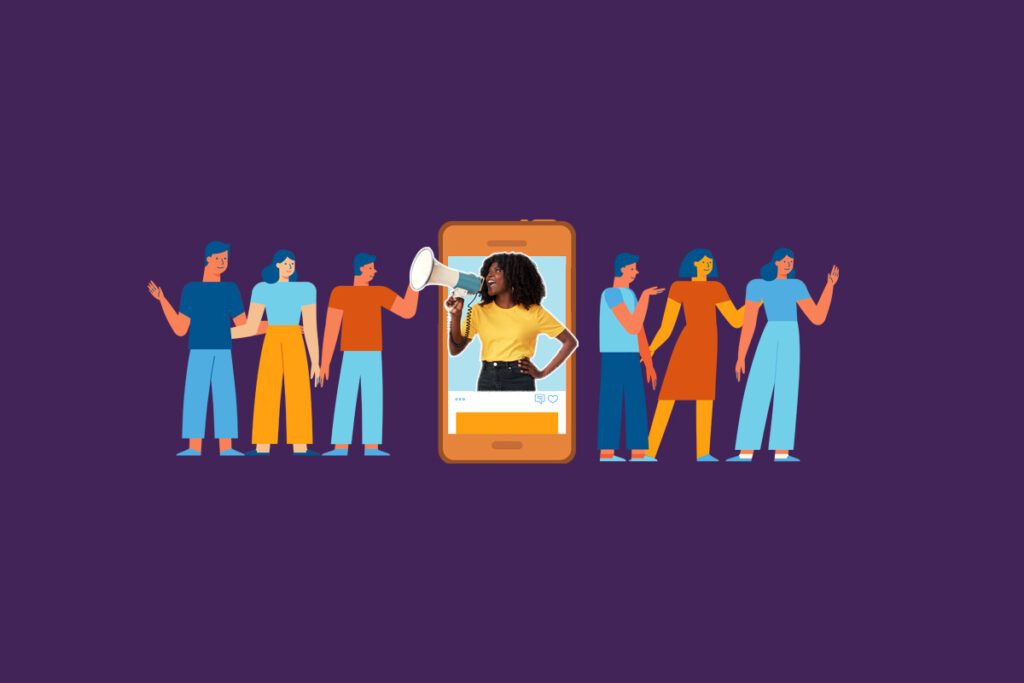
Scrolling your social feeds might sometimes feel like you’re watching a commercial.
Whether it’s musicians, actors, athletes, or other people with larger online followings, Influencer marketing usually involves someone promoting, explaining, or recommending a product to buy.
It’s nothing new to have a celeb endorse a brand (it’s been going on since the 1930s!), but in the mid-late 2010s, brands began working with regular people – mostly those who had naturally gained a large following online – to help sell their products.
Influencer marketing worked because people would trust product recommendations from who they followed. As the influencers’ follower counts grew, they became celebrities in their own right. People like Jaclyn Hill, David Dobrik, and Addison Rae turned their digital careers into physical opportunities. Soon, these reviews from “regular” people (many wearing designer brands and showing off their multimillion dollar homes) didn’t feel authentic.
Influencing became less associated with honest reviews and real-life experiences and more about “drama” between influencers, luxurious brand trips, and total excess. Now, “influencer” tends to have a negative connotation, which is why many have shifted to calling themselves “content creators.” This title has less of the negative feelings associated with it, mostly because it puts the focus on the creativity aspect, rather than trying to convince someone to buy something.
No matter the term, it’s all about authenticity.
Consumers can tell when something feels off and they can usually tell when they’re being lied to. Last year, beauty creator Mikayla Nogueira Hawken received backlash online after allegedly using fake eyelashes to lie about the effects of a L’Oreal mascara. Followers were upset because they felt like Mikayla was lying for a check from L’Oreal – which made both the makeup guru and the brand look bad.
People make mistakes and we’re not here to judge! But one misstep with your audience can create distrust in your brand. As a business, partnering with the right content creator is crucial. You need to make sure content creators align with your brand’s vision and mission and that your partnership feels authentic. If a well-known video gamer was to suddenly start posting sponsored content with a beauty company, it would feel weird. However, if a health and fitness creator promoted the same brand, it may make more sense. Make sure whoever is helping you promote your product is getting it in front of the right people and that it feels like a natural suggestion from them.
Lana Del Rey for SKIMS
(Image credit: SKIMS)
Singer-songwriter Lana Del Rey was the face of Kim Kardashian’s SKIMS 2024 Valentine’s Day collection. Because who better to sell Valentine’s Day-themed lingerie, loungewear, and shapewear than Lana, whose songs are always focused on romance, heartbreak, and being hopelessly lovesick?
Fenty Beauty: ‘Beauty for all’
(Image credit: Fenty Beauty by Rihanna)
Pop star Rihanna debuted her beauty brand Fenty Beauty in 2017 and tapped beauty influencers with different skin tones to help show off the line’s history-making 40-shade foundation range. Instead of including just one or two influencers with deeper complexions, Fenty’s “Beauty for all” campaign showed off creators with all different skin tones, including Nyma Tang, a YouTuber known for reviewing the darkest shade of foundation in each brand.
Keith Lee and Chiptole: The Keithadilla
(Image credit: Chipolte)
Keith Lee rose to internet fame for trying and rating food from local restaurants. His reviews are always authentic, which helped him create a fiercely loyal fan base. After Keith tested out a secret menu item at Chipotle, the brand took advantage of the momentum and released the “Keithadilla” in the app.
Finding the right content creator to work with your brand can feel overwhelming, but don’t let that stop you. Connecting with the right content creators can help you reach your audience online.